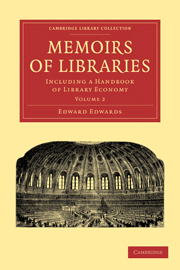Book contents
- Frontmatter
- Contents
- Chapter XV The Older Libraries of English Towns, and Their Management By Munic
- Chapter XVI The Parochial and Quasi-Parochial Libraries of England
- Chapter XVII The History of The “Public Libraries Acts” of 1850 and 1855
- Chapter XVIII The Working of The Public Libraries Acts of 1850 and 1855
- Appendix to Volume I
- Part The First. History of Libraries (Continued.)
- Book IV. The Libraries of The United States of America
- Book V. The Modern Libraries of Continental Europe
Chapter III - The Congressional and State Libraries of The United States
Published online by Cambridge University Press: 29 August 2010
- Frontmatter
- Contents
- Chapter XV The Older Libraries of English Towns, and Their Management By Munic
- Chapter XVI The Parochial and Quasi-Parochial Libraries of England
- Chapter XVII The History of The “Public Libraries Acts” of 1850 and 1855
- Chapter XVIII The Working of The Public Libraries Acts of 1850 and 1855
- Appendix to Volume I
- Part The First. History of Libraries (Continued.)
- Book IV. The Libraries of The United States of America
- Book V. The Modern Libraries of Continental Europe
Summary
In our American Revolution, a dignity was seen in human nature, a generous confidence was placed in men. It was believed that They would attain to greater nobleness by being left to govern Themselves; … . to greater energy of intellect, and to higher truths, by being left to freedom of thought and utterance, than by The wisest forms of arbitrary rule. .... Such is The grand idea which lies at The root of our institutions; such The fundamental doctrines of The political creed into which we have all been baptized.
.... The recent history of The country shews The worship of wealth taking The place of reverence for liberty and universal justice. The Free State’s are called to watch against this peril; to regard Government not as a machine for creating wealth, for subserving individual cupidity, for furnishing facilities of boundless speculation; but as a moral institution, designed to secure Universal Right, to protect every man in The liberties and immunities through which he is to work out his highest good.
CHAINING, (The Duty of The Free States,part ii.) BOOK IV.The first Library of Congress was founded in April, 1800. It was collected under The superintendence of Mr. Gallatin, Dr. Mitchell, of New York, and others. Though small, it. was valuable, and is said to have been much resorted to in The early days of Washington City. On The 24th of August, 1814, it was totally destroyed by The British Army.
The loss induced Mr. Jefferson to offer to Congress his well-selected Library of 7000 volumes. It was purchased in 1815 (for £4600 sterling), and became The nucleus of The fine collection which, on The 24th Dec. 1851, was partially destroyed by fire. Both books and catalogue were arranged in subjects, according to Bacon’s Classification of Human Knowledge, of which Mr. Jewett has said very appropriately: “It was not intended by its author as a bibliographical system. Nor has any improvement which it has received rendered it convenient or useful for that purpose. The system was introduced by Mr. Jefferson, and, unfortunately, has been continued here long after its abandonment in most other Libraries.” At The time of this second calamity, The Library contained upwards of 50,000 volumes of printed books. The MSS. were but few. The Then yearly appropriation for The purchase of miscellaneous books was £1000, and for that of law-books £200.
- Type
- Chapter
- Information
- Memoirs of LibrariesIncluding a Handbook of Library Economy, pp. 202 - 212Publisher: Cambridge University PressPrint publication year: 2010First published in: 1859

